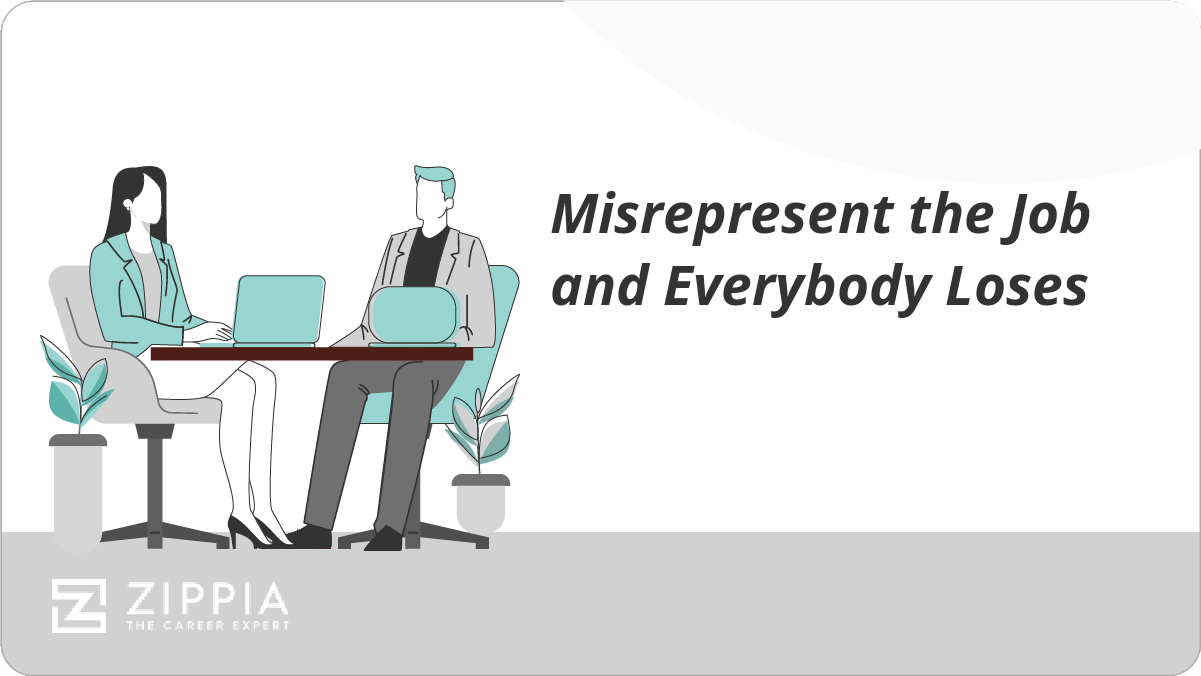By clicking Download, you agree to Zippia’s Privacy Policy and Terms of Use.

When advertising a position, it can be tempting to exaggerate its attributes in order to attract the best possible candidates. The danger with this is that if you attract a candidate who is over-qualified, they will not only be unhappy in the role and leave within a short time, but they may also accuse you of misrepresenting the job.
In this article, we’ll talk about the types of employer misrepresentation, as well as candidate misrepresentation and the consequences of each.
Key Takeaways
-
Both candidates and employers can misrepresent themselves during the hiring process.
-
Employer misrepresentation can negatively impact morale, create high turnover, and cause legal trouble for companies.
-
Employers misrepresent themselves by exaggerating a position’s responsibilities, leaving out important contingencies for salary or promotions, or making unfulfillable promises.

Candidate Misrepresentation
There have been numerous instances of candidates embellishing their resumes or even downright lying in order to get the job.
A recent high-profile example was former Yahoo CEO, Scott Thompson, whose CV included a fictitious Computer Science degree from a Boston college.
This bogus degree was featured in his CV through two different high-powered positions, simply because no one in either company thought to pick up the phone and check his credentials.
To protect yourself from candidate misrepresentation, you should always conduct at least two verbal references or background checks before making any new hire.
Employer Misrepresentation and Its Consequences
While candidate misrepresentation usually leads to the perfunctory dismissal of the employee, the repercussions of employer misrepresentation can be far more serious.
-
Hiring a candidate under false pretenses can have a negative impact on your entire team. A disgruntled employee will not give 100% to a job they did not think they were being hired to do.
They will also spread negativity to the employees around them and from one bad seed, a tree of dissention can grow.
-
They are unlikely to want to stay in a job that was misrepresented to them. From the moment they discover they have been misled, they will be looking for another job on your time.
Then they will leave, probably at short notice, and you will be faced with all the trouble and expense of hiring a replacement for them.
-
In the worst-case scenario, they will accuse you of misrepresenting the job and seek legal recourse. This is something that is starting to happen more and more.
The Legal Consequences of Negligent Employer Misrepresentation
There have been a number of cases in the US where candidates have sued successfully for “negligent misrepresentation” by an employer.
Unlike fraud, negligent misrepresentation is where an employer:
-
Exaggerates the responsibilities of a position.
-
Neglects to mention conditions upon which salary or promotions may be contingent.
-
Makes promises they simply cannot keep.
In order to sue for damages, the candidate must have suffered damages as a result of your misrepresentation. These damages could be in the form of expenses associated with relocating to a new state or losses incurred as a result of turning down another job to accept yours.
Recruiters can also be sued for negligent misrepresentation, if it can be shown that they “consulted” with their client, regardless of whether they knew the job advertisement to be exaggerated or untrue.
Employer Misrepresentation Case Studies
In Australia, two provisions of the Competition and Consumer Act 2010 (formerly the Trade Practices Act 1974) have been used by employees to establish claims of misrepresentation by employers.
Cases where these provisions were used to establish claims include:
-
Walker v Citigroup Local Markets Australia Pty Ltd – in which a stockbroker successfully established misleading or deceptive conduct by the prospective employer over representations about a future job that did not eventuate.
-
Morton v Interpro Australia Pty Ltd and Anor – in which a sales employee established misleading conduct by the employer over a bonus structure that was promised but not delivered.
When you add up the costs of lost productivity and rehiring expenses, a bad hire, whether through candidate or employer misrepresentation, will cost you around three times the candidate’s salary. So before you promise a certain salary, promotion within a certain timeframe, a company car, or an office with a view, make sure you can deliver.
Because while everybody loses when a job is misrepresented, the biggest loser in most cases is likely to be you.
Employer Misrepresentation FAQ
-
What is negligent misrepresentation?
Negligent misrepresentation is when someone makes a statement while disregarding true facts.
An example of negligent misrepresentation is a company telling a job candidate that they’ll get a raise at the end of the year when really they can’t get a raise until they’ve worked for the company one calendar year.
What is innocent misrepresentation?
Innocent misrepresentation is when someone accidentally makes an untrue statement.
An example of this is when a company tells a candidate they’ll be working for a particular manager, not knowing that that manager would put in their two weeks notice right after the candidate was hired.
- Writing A Job Description
- How to Write a Job Description
- Equal Opportunity Employer Statement
- DOE Salary
- Job Posting Template
- How to Write a Job Description
- How to Write a Candidate Profile
- How to Write a Job Ad
- How to Post a Job
- Writing a Company Description
- Free Ways to Post Jobs
- How To Write A Compelling Job Description
- How To Tweak Job Descriptions For Better Talent
- Why You Shouldn't Misrepresent The Job
- Common Mistakes In Job Descriptions
- How To Qualify A Job Brief
- What Is A Job Description?
- Application Questions To Find The Right Candidate
- How To Make An Application Form
- Roles and Responsibilities Template





